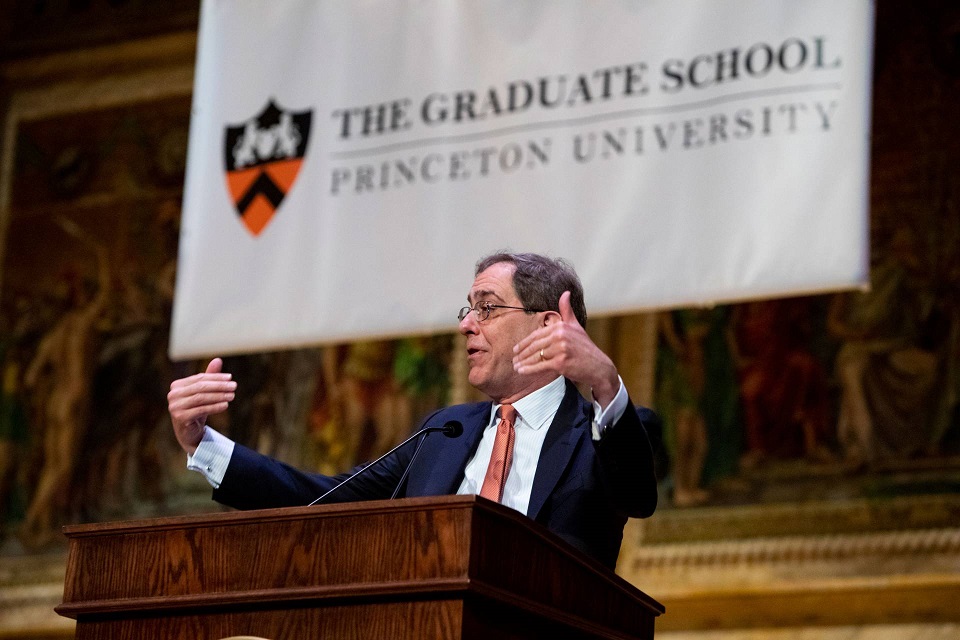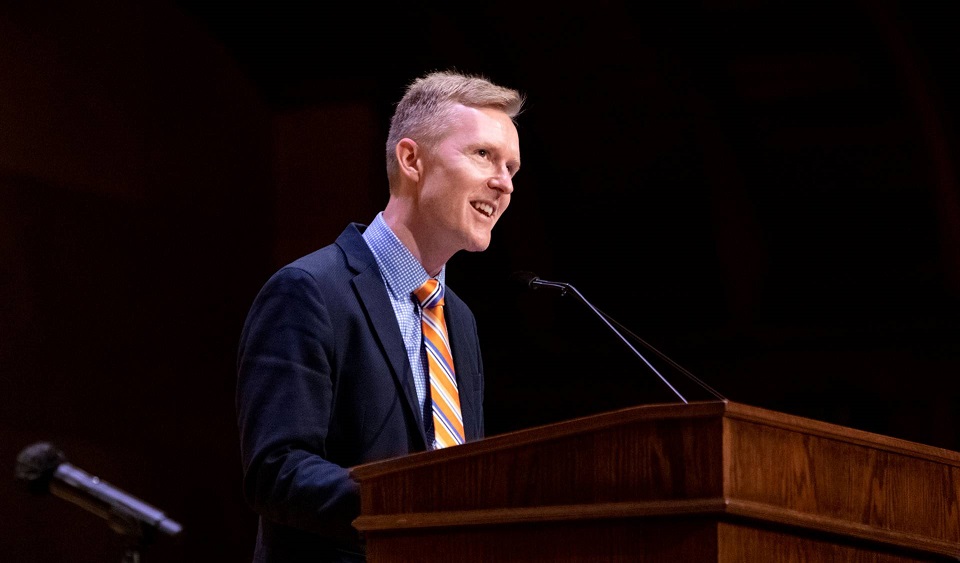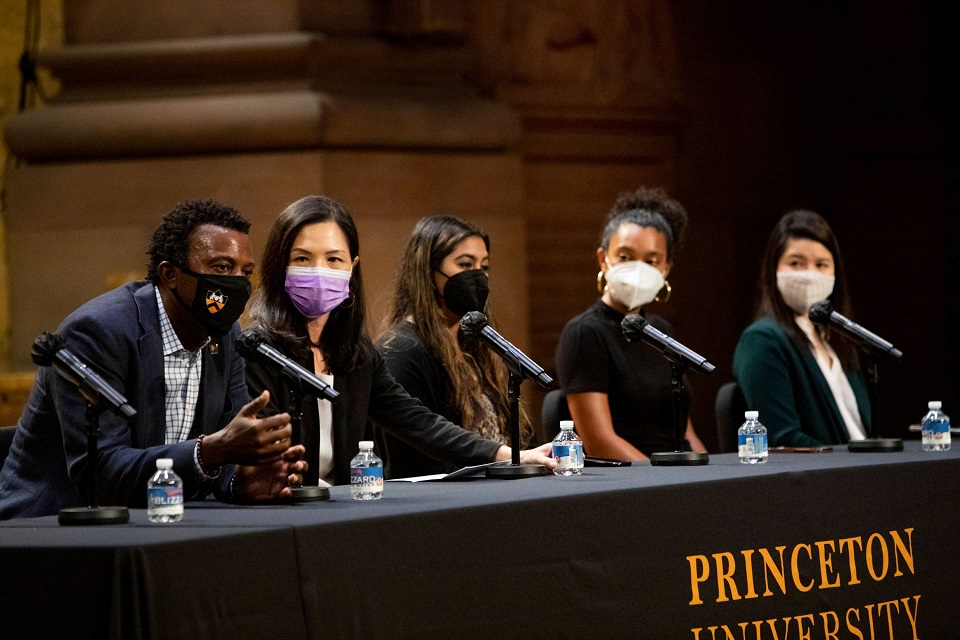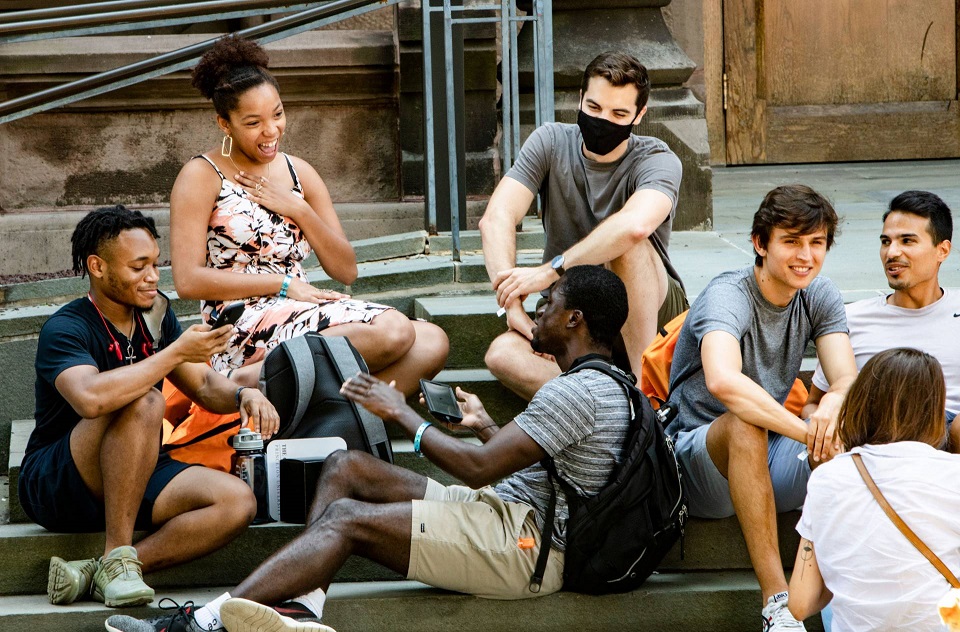Princeton University welcomed 713 graduate students from 54 countries for the 2021-22 academic year during orientation activities held Aug. 25-26.
The Graduate School again admitted and yielded its most diverse cohort of students, with 24% of incoming domestic students (including terminal master’s and Ph.D. students) from underrepresented groups. Incoming underrepresented domestic Ph.D. students will comprise 23% of the domestic Ph.D. population — a historic high.
In a keynote address on Wednesday, Aug. 25, in Richardson Auditorium in Alexander Hall, Princeton President Christopher L. Eisgruber expressed jubilation for Princeton’s return to full, in-person teaching and operations for the first time since March 2020. While a limited number of students, faculty and staff remained on campus during the COVID-19 pandemic, most worked virtually.
“I am so glad that you are here,” he told his audience, with great emotion in his voice. “And it is really so great to see you. I have a colleague who has talked about not only having students back on our campus, but having these gatherings together as ‘life-affirming.’ And that is how it feels to be here with you and to feel your energy. So welcome to Princeton!”
During his speech, Eisgruber noted the historic diversity of the incoming class and indicated the need for further efforts to attract and retain talented graduate students from a wide range of backgrounds.
“One thing I never tire of saying is, ‘Look, if we want to diversify the faculties of the world, we must diversify our Graduate School, because our Graduate School is where we produce the faculty who are going to lead in the future,’” he said.

Among the graduate school’s diversity pipeline programs to help promising students reach the professoriate, its Pre-Doctoral Fellowship Initiative this year will welcome its largest cohort. Since the program’s inception three years ago, every Princeton Pre-Doctoral Fellow has matriculated from fellow to a Princeton graduate student.
Participants in the Graduate Scholars Program, aimed at enhancing and supporting the academic, social and community development of underrepresented students during their studies, attended a welcome retreat Aug. 23-24 that included small group activities and workshops.
During the Graduate School’s orientation, students gathered under a tent outside Alexander Hall to introduce themselves to one another and to share meals. They learned about University services and activities, and also attended in-person and virtual sessions about navigating graduate life.
Prior to Eisgruber’s remarks, Cole Crittenden, acting dean and deputy dean of the Graduate School, welcomed all in attendance.
“It is not an exaggeration to say we are elated to have you here in Richardson Auditorium as the University returns fully to what it does best — in-person teaching, learning and research.”
Crittenden, who earned a Ph.D. from Princeton in 2005, highlighted the resources available to graduate students and encouraged them to seek out support throughout their time at Princeton.
“You have supportive faculty and staff,” he said. “You also have those of us who work in the Office of the Dean of the Graduate School. … You also have one another. Your peers will become your lifelong friends and colleagues, supporting you as you support them. Don’t be afraid to open up and lean on one another as you face challenges.”

Faculty and returning students shared their experiences and offered practical advice to incoming students as part of the “Success in Graduate School” panel.
The panel featured Rodney Priestley, the Pomeroy and Betty Perry Smith Professor of Chemical and Biological Engineering, and vice dean for innovation; Christina Lee, who graduated from Princeton with a Ph.D. in 1999 and is now an associate professor of Spanish and Portuguese; Lauren Feldman, a graduate student in psychology and president of the Graduate Student Government; Mélena Laudig, a graduate student in religion; and Nausheen Rajan, a graduate student in the Princeton School of Public and International Affairs.
Their discussion touched upon how to develop resilience, the need for connection and the importance of caring for one’s mental health.
“There will be ups and downs in graduate school — everything will not work the first time around — so patience is very important, and do not get discouraged at all,” Priestley said.
He added, “This is the only time you will be a graduate student, and so this is a time you want to enjoy very much and have a wonderful experience.”
Lee reassured students of their abilities, reminding them they are in training to become their professors’ eventual colleagues and peers.
“You are here in the Ph.D. program, not because of your ability to achieve and reproduce what your professors think or do, but because of your unique potential to make a meaningful contribution to your discipline,” she said. “In other words, we have much to learn from you.”
Rajan urged her new classmates to be kind to themselves, to embrace the community around them, and not to get bogged down in the minutiae of their degree requirements. A free hour might be better spent meeting an alumnus, reading a book for pleasure or getting to know one’s peers, she said.
“Take advantage of this experience and all it has to offer you,” she said.

Incoming students commented that being in person, once again, facilitates those critical connections with one another and with the University community as a whole.
“As a graduate student, having your cohort around you is really important,” said Amel Bensalim, a doctoral student in history. “It can be very isolating otherwise.”
Wilbur Wang, who graduated from Princeton in 2021 with a degree in operations research and financial engineering and who returned to the department for a master’s program, said he was grateful for a full return to campus.
“The sense of really belonging to a place depends on how much access you have to a place,” he said.

Post originally featured on Princeton University website.

